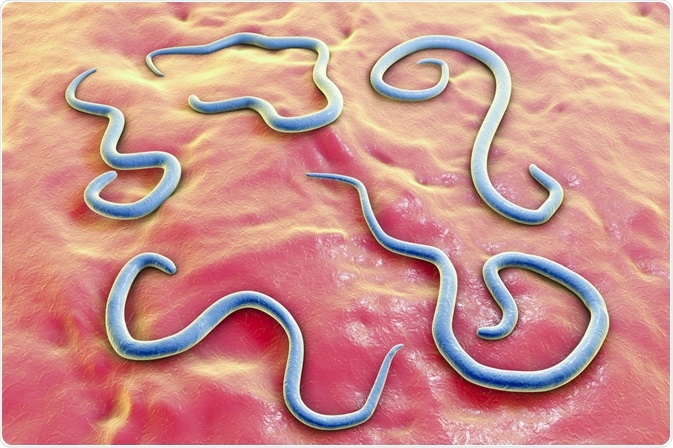Because humans live with dogs and cats everywhere in the world, toxocariasis, which is an infection by dog and cat roundworms, is widespread globally. Children are vulnerable to infection by roundworm eggs in the soil, and serious illness can develop as the larval roundworms infect the organs and tissues of the body.

Image Credit: Kateryna Kon / Shutterstock.com
A study of toxocariasis prevalence in North America showed that risk factors for infection included pet ownership, poverty, male sex, and African-American race. In Mexico, a higher risk of infection was associated with asthmatic children and psychiatric hospital inpatients. These studies show that the burden of disease in the population is significant, and could stand to be reduced through prevention measures.
Toxocariasis can be treated with a 5-day course of the medication albendazole. However, prevention of infection is preferable wherever possible.
Clean play areas
One important strategy for preventing infection is to stop the deposition of cat or dog feces in spaces where children play, like parks and sandboxes. In a Japanese study, the use of plastic covers on sandboxes was found effective for preventing pets from defecating in the sand and the increased daytime heat under the cover destroyed existing eggs in the sand. Some communities have approached the problem by eliminating sandboxes in public parks.
Since eggs require at least two weeks to become infectious, prompt cleanup of pet feces can greatly reduce transmission of the parasite.
Pet care
Another mode of prevention is the routine treatment of dogs and cats with anti-parasitic medications like ivermectin and mebendazole. Regular stool sample examinations for pets can also play a role in reducing toxocariasis.
For pet owners, the best practices include regular fecal testing of cats and dogs and treatment with anti-helminthics. Puppies and kittens should be tested for intestinal parasites four times in the first year of life. Adults should be tested twice a year.
Puppies and kittens should be de-wormed starting at 2 weeks of age, with treatment being repeated every two weeks until they are transitioned to broad-spectrum parasitic control. Adult pets should receive year-round broad-spectrum parasitic control that includes an agent effective against ascarids.
Public health
Toxocariasis can also be spread in drinking water. A study of reservoirs around Moscow showed significant contamination by Toxocara eggs, and toxocariasis among children who bathed in those waters. Effective prevention should address sources of Toxocara contamination in lakes, reservoirs, and drinking water.
Encouraging children to wash their hands after playing outdoors or playing with pets and before handling food can also significantly prevent toxocariasis.
Future initiatives
Further work is necessary to prevent the spread of toxocariasis. Those needed efforts would include better studies of the epidemiology of the disease, advances in diagnosis and treatment methods, and expansion of programs for proven effective interventions.
These goals are challenging because toxocariasis disproportionately affects people living in poverty with less access to health care. A first step would be targeted surveillance and screening programs in vulnerable populations.
References
Further Reading
Last Updated: Feb 17, 2023